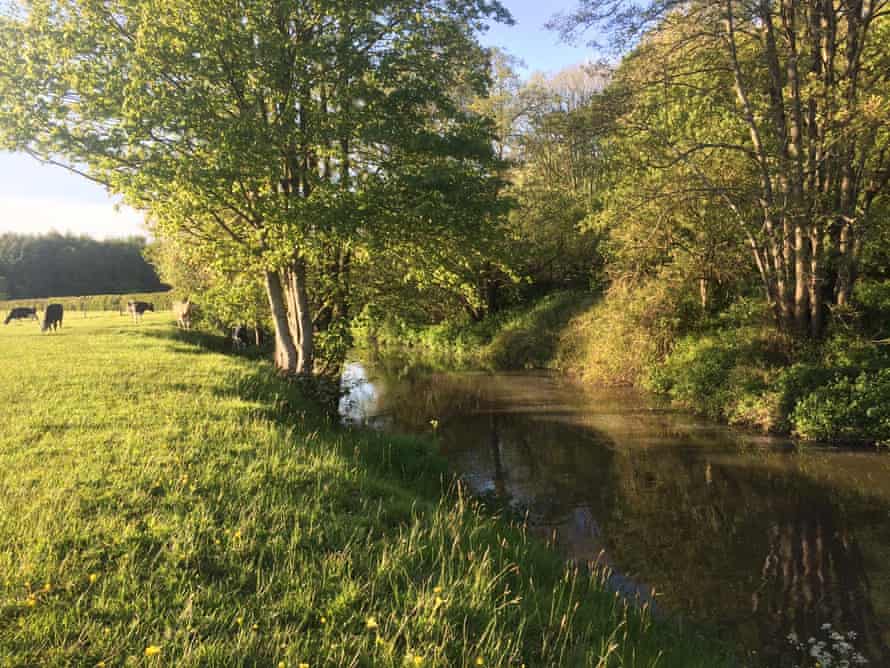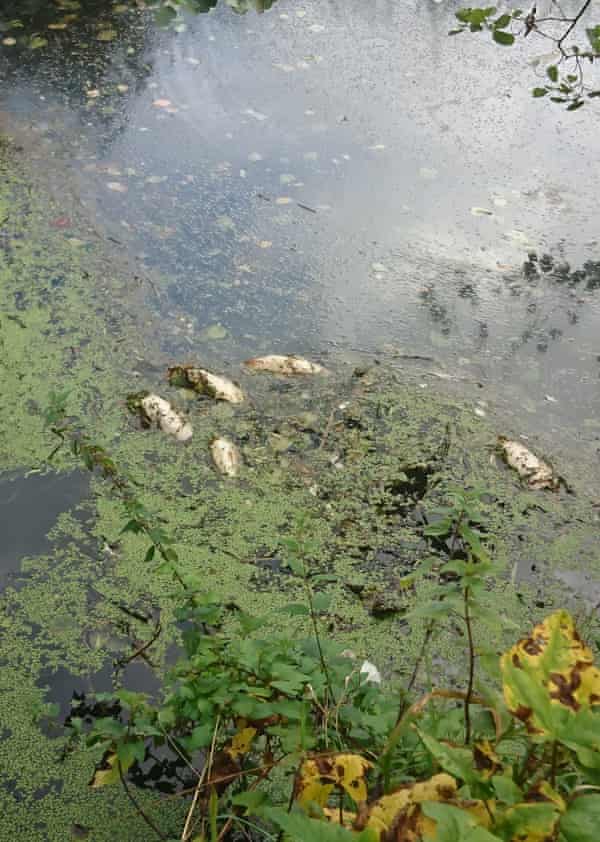Laws of nature: could UK rivers be given the same rights as people?
As more and more countries grant natural features or ecosystems legal personhood, the UK’s fight to pass nature rights laws is quietly gaining pace

The River Frome murmurs and babbles through the woods and fields of north Somerset. It is popular with anglers and wild swimmers but is often polluted with a cocktail of agricultural runoff, leading to frequent complaints from the public.
In 2018, Frome Town Council tried to pass a bylaw giving part of the river and the adjacent Rodden meadow the status of a person in law. This would establish their right to exist, flourish and thrive, and for the river to flow freely and have a natural water cycle, as well as ensuring timely and effective restoration if they were damaged. The council and a local charity, Friends of the River Frome, were to be made joint guardians of the river and meadow, tasked with balancing their interests with the health and safety of local people.
The bylaw was turned down in 2020, but the fight to give UK rivers rights continues today. On midsummer’s eve, members of Cambridge community group Friends of the Cam held a ceremony to establish the rights of their river based on the Earth Law Center’s Universal Declaration of River Rights. Sharing songs and stories about people’s individual connections with the river, they declared that the Cam had the right to flow, to be free from over-abstration and pollution and to host native biodiversity – and appointed themselves as its guardians.
“I think it’s great to keep this idea alive,” says Frome councillor Richard Ackroyd. “It’s possible, it’s not an airy fairy idea with no chance. It could be a reality and wouldn’t that change things?”
The idea of giving rights to nature has been around for years; laws giving natural features such as rivers and mountains, or ecosystems, legal personhood have been enacted around the world, from Ecuador to New Zealand, and have recently been subject to the first enforcement case in the US. But no such law has been passed in the UK.
Campaigners have tentatively explored rights for British rivers such as the Thames and the Findhorn in north-east Scotland, but efforts in Frome have been the most advanced.
Mumta Ito, a lawyer and founder of NGO Nature’s Rights who seeded the idea of the bylaw as a test case, says it would have set an important legal precedent. “Environmental law tackles the stuff that is illegal. The whole point of nature’s rights is to tackle all the stuff that destroys nature that is legal but not aligned with a regenerative culture. The real problem on the Frome is diffuse pollution, so if the river had been given rights how would agriculture need to change to respect those rights?”

The bylaw would have made it easier for individuals and the local authority to take action when the river ecosystem was damaged, says Ackroyd. “What I liked about it was that it takes away the idea that the only influence you’ve got is if you’re a big landowner, or your property has been damaged in some way.”
He said the response to the proposed bylaw had been overwhelmingly positive in the council and among the public, but as the town was unable to pass such a law by itself it had to ask the Ministry of Housing, Communities and Local Government for approval.
The request was rejected last year on the grounds that it would duplicate existing environmental laws. “But of course it wouldn’t, because the seismic shift of it is that it’s not really based on property rights,” says Ackroyd.
Ito is sceptical of the UK’s readiness for such a fundamental cultural shift. “At its roots, nature’s rights is about a big restructuring, because concentration of wealth and power happened on the back of property rights, which was a system of exclusion. If private property was subject to the rights of the ecosystems that inhabit that property then it’s not free for the trash and burn – it comes with a duty of care.”
“This country’s going to be a bit of a hard nut to crack,” agrees Paul Powlesland, a barrister at Garden Court Chambers and founder of NGO Lawyers for Nature, who is keen to advance nature rights in the UK. “In many ways we came up with – and exported around the world – the idea of nature as a dead thing to be exploited.”
He points out that even existing laws to protect nature, particularly rivers, are being “fundamentally ignored”, and that the institutions tasked with upholding them are failing. As well as being affected by farming waste, the Frome is one of many rivers across the country that has been polluted with sewage from overflowing drainage systems, a problem highlighted by the Guardian.
But the law is not immutable, says Powlesland. “Over the years there has been a gradual extension of those who are the subject rather than the object of legal rights.” Once the preserve of rich white men, rights have been gradually extended to include all humans. “We even managed to figure out how to give rights to [companies] before we figured out how to give rights to living things which we rely on for our own existence.”
It is notable that many countries that have passed nature rights laws have strong indigenous cultures in which nature is a core principle and has intrinsic value.
“We have lost our indigenous voice,” says Powlesland, “but I believe that we can all go back to a deeper relationship with nature and these lands. The current political system is possibly not that amenable to a radical concept like rights of nature, but any law could be changed to anything if parliament wanted to do so.”
Ito is more circumspect. A few years ago, she succeeded in convincing all the UK’s green parties to support the principle of nature rights, but is disappointed that the commitment to these rights has not appeared in manifestos or had much political traction.
In fact, in the two years that it took the UK government to make a decision on the Frome bylaw, Ito made “much more headway” at EU level. She was invited to produce a study on nature rights for the European Economic and Social Council and is now in discussions about an EU charter on fundamental rights of nature.
“They’re actually entering into conversation with us about it,” she says. “Here in the UK, you get a one-liner from the secretary of state and that’s it. There’s nobody you can talk to; it’s a closed shop.”

Undaunted, Powlesland is working on a toolkit to help people imagine and enforce nature rights within the current legal framework. “I am seeing more people clearly expressing their love of nature and desire to protect it. The magic of this rights of nature discourse is it takes a lot of the things that people are doing already – there are some amazing activists doing excellent work all around the country – and puts it into a framework that has a power to it.
“If enough people started to peacefully stand up for nature on a national level, regardless of what the current rules are, that would change those rules,” he says.
Nature rights around the world
Canada: Canada’s first rights of nature law was passed in February by the Minganie regional county municipality and the Innu council of Ekuanitshit in Quebec. The local authority and indigenous council assigned the Magpie river nine rights, including the right to be safe from pollution and the right to sue, as well as the ability to assign legal guardians to ensure those rights are respected.
Ecuador: The first country to adopt a rights of nature law in its national constitution, Ecuador states that nature (known as pachamama) has the right to exist, persist, maintain and regenerate. Those rights have been upheld several times in court, although ensuring the legal rulings are enforced has proved more difficult.
Bangladesh: All rivers in Bangladesh were given explicit rights to be protected in 2019, after people complained that the shores of the Turag river were being excessively built-up and the water was too polluted. The high court agreed this was a problem and granted all rivers in the country legal personhood, a decision upheld by the supreme court last year.
US: In May, a network of streams, lakes and marshes in Orange county, Florida, sued a developer and the state to try to stop a housing development from destroying them. While many US municipalities have adopted rights of nature laws, this was the first time anyone had tried to enforce them in court.
Find more age of extinction coverage here, and follow biodiversity reporters Phoebe Weston and Patrick Greenfield on Twitter for all the latest news and features
